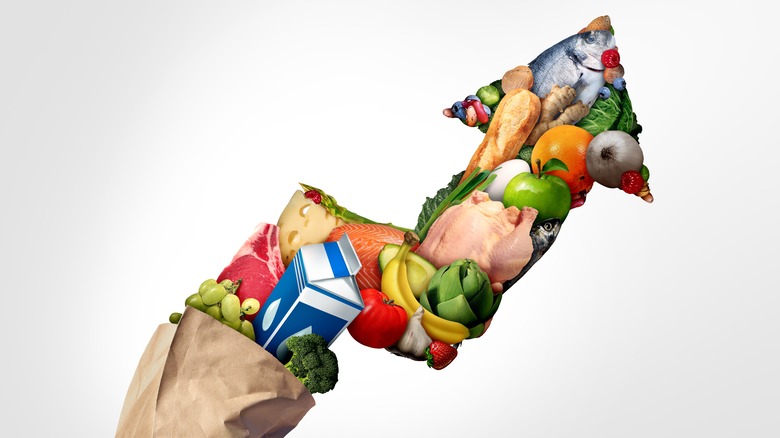How The Rising Cost Of Food Could Affect Obesity Rates
The U.S. Department of Agriculture predicts that food prices could rise up to 8% in the next year. This inflation is a result of many factors, including rising populations, impacts of the pandemic, the war in Ukraine, and increased transportation and energy prices, explains CBS News. This inflation is not only a threat to our food system, but surging food costs could also mean skyrocketing obesity rates — but why?
While it's common knowledge that a nutrient-rich diet is important for wellbeing, the convenience and temptation of processed junk foods can be hard to resist, jeopardizing our health. In fact, the Center for Disease Control and Prevention (CDC) notes that over the last twenty years, the percentage of the population considered obese has increased by 11.4%, currently affecting almost 42% of Americans.
Although a healthy diet coupled with regular exercise can help combat obesity, (via the CDC), genetics and social factors can also play a role, which means obesity is not solely rooted in overconsumption.
Food insecurity impacts weight gain
A global issue, inflation can negatively impact the availability and accessibility of nutritious foods. As Harvard's School of Public Health explains, buying healthy foods like fresh produce, whole grains, and lean proteins is (and has been) more expensive than purchasing refined foods that are more likely to satisfy thanks to their high-calorie count. But, the issue of obesity is a bit more complex than just eating a lot of cheap, unhealthy foods.
According to Wired, obesity can increase when there's a lack of food because of a psychological phenomenon called the insurance hypothesis, which also has significant physiological effects. Basically, an inadequate food supply or food insecurity can signal the body to store fat as a means of survival through periods of food scarcity. At the same time, this seems to lead to a subconscious change in behavior too, in which people decrease their physical activity, prompting excessive weight gain. That means that even if outrageous food prices cause more people to face food insecurity, they're still at risk for obesity!
A true tale of overconsumption versus underconsumption, it's important to make healthy choices while staying budget-friendly. Luckily, CBC shares tips to alleviate costs like using coupons, buying in bulk, and even starting your own backyard garden.

